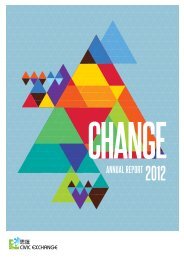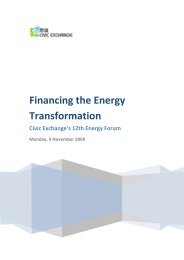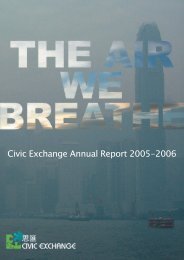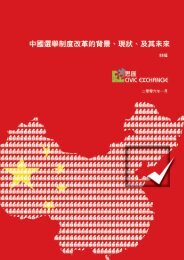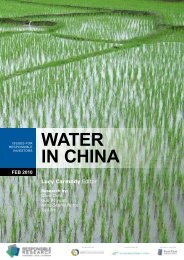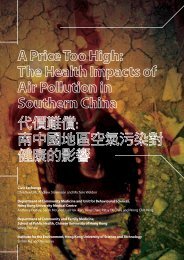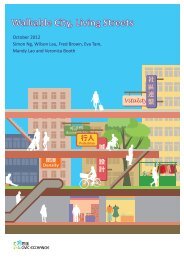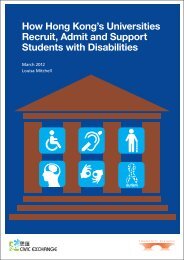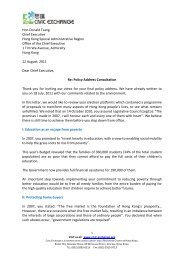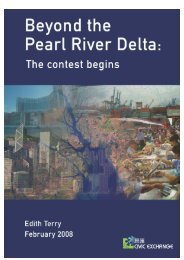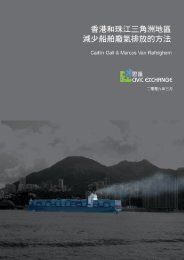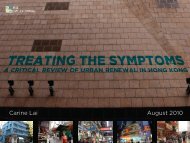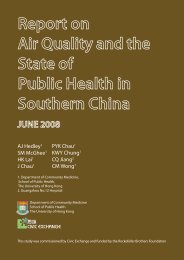Untitled - Civic Exchange
Untitled - Civic Exchange
Untitled - Civic Exchange
Create successful ePaper yourself
Turn your PDF publications into a flip-book with our unique Google optimized e-Paper software.
Chapter 6:<br />
Hong Kong's Freight Transport<br />
More than half of airfreight is carried in the holds of passenger aircraft. Thus, without massive and<br />
expensive expansion of dedicated cargo fleets, projections of passenger and cargo volumes are interlinked.<br />
There were declines in the volume of both passengers and freight in 2001 (especially cargo), in part<br />
because of economic conditions and in part because of the events in the United States on September 11,<br />
2001. Both passenger and cargo volumes increased during the first quarter of 2002 over the first quarter of<br />
2001 - passengers by 0.4% and cargo by 15.6% - perhaps putting the volume of cargo handled annually<br />
back on its previous trajectory. 210<br />
Fuel prices may be of greater importance for longer-term projections of airfreight volumes than security<br />
factors or economic considerations. There is considerable debate among geologists, economists, and others<br />
as to when production of conventional oil will peak, 211 and the possibility that oil prices will rise<br />
dramatically during the next few decades should not be discounted.<br />
Because aircraft are fuel intensive and there are no taxes on the fuel used for international flights, airlines<br />
costs are extremely sensitive to crude oil prices. Historically, fuel costs comprise 15-30% of aviation's total<br />
expenses, a much higher proportion of total costs than for other modes of transport. It is hard to predict<br />
how much real crude oil prices will rise after the production peak, but a factor of five over current prices<br />
by 2015 may be plausible. Such an increase would make the movement of people and freight as we know<br />
it impracticable.<br />
The projections for air cargo make no reference to their potentially acute sensitivity to oil prices. This<br />
would seem unwise given the uncertainties about oil production and the large amounts of investment<br />
involved. It could be argued that airfreight may be so insensitive to price that a fivefold or greater increase<br />
in fuel prices may be of little consequence, but the little available evidence suggests that airfreight is quite<br />
sensitive to economic conditions, and perhaps more so than air travel (for example, the experience during<br />
2001 noted above).<br />
Projections of growth in the goods vehicle fleet and in cross-border traffic are set out in Table 6.2, which<br />
presents scenarios that have been adopted by the<br />
Table 6.2 Projections of numbers of licensed goods<br />
Hong Kong government. 212 The preferred scenario vehicles and daily cross-border traffic in 2016<br />
seems to be the one listed here as "2016 high (1)."<br />
Under this scenario, the number of goods vehicles on<br />
the road will more than double between 1997 and<br />
2016 and cross-border traffic will increase four-fold.<br />
Scenario<br />
Licensed goods<br />
vehicles<br />
(growth)<br />
Daily crossboundary<br />
tra ffic<br />
(growth)<br />
The projection of the number of goods vehicles on<br />
the road is extraordinary in view of recent trends.<br />
The number of goods vehicles on the road in Hong<br />
Kong has hardly changed during the last decade,<br />
although there have been changes in fleet<br />
composition, as illustrated in Figure 6.1. Thus, for<br />
reasons that are not mentioned in the projection<br />
report, the Hong Kong government expects that a<br />
decade during which there was essentially no change<br />
in the number of goods vehicles will be followed by<br />
1997 baseline 117,000 30,000<br />
2016 low<br />
2016 medium<br />
2016 high (1)<br />
2016 high (2)<br />
141,000<br />
(21%)<br />
185,000<br />
(58%)<br />
262,000<br />
(124%)<br />
262,000<br />
(124%)<br />
85,000<br />
(183%)<br />
120 ,000<br />
(300%)<br />
120 ,000<br />
(300%)<br />
164 ,000<br />
(447%)<br />
210 Information about the first quarter of 2002 is from Hong Kong iMail, April 12, 2002.<br />
211 See Bentley, R.W. (2002), "Global oil & gas depletion: an overview," Energy Policy, Vol.30, pp.189-205;<br />
Gilbert, R. (2002), Electrifying Hong Kong: Making Transport Sustainable, Hong Kong: <strong>Civic</strong> <strong>Exchange</strong> & the<br />
Asia Foundation, Section 5.1; and other sources referenced there.<br />
212 The projections in Table 6.2 are those in Transport Department (1999), Third Comprehensive Transport Study,<br />
Hong Kong: HKSAR Government.<br />
63



